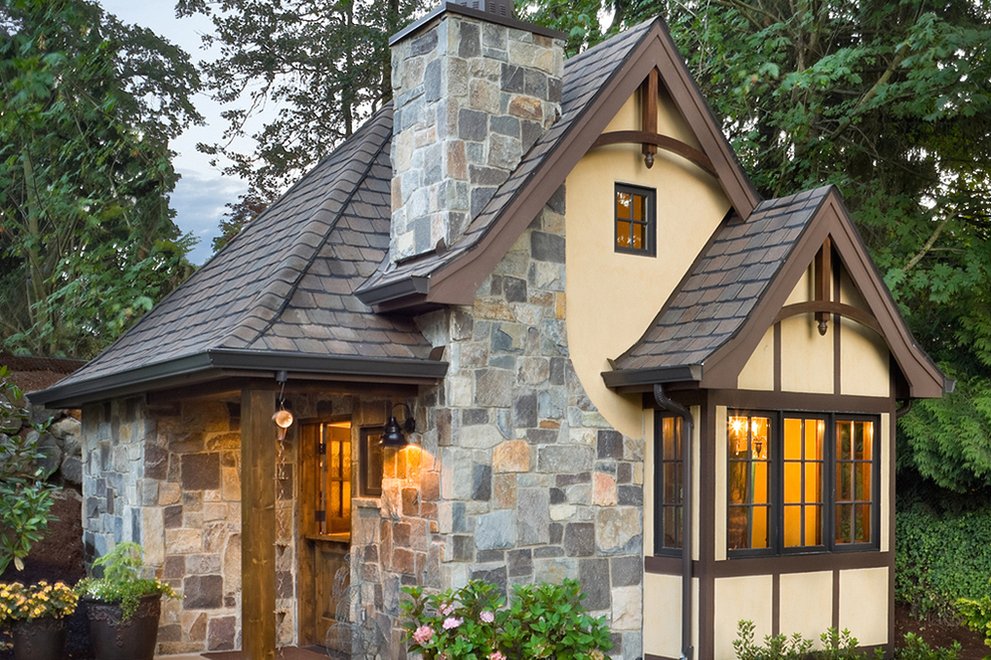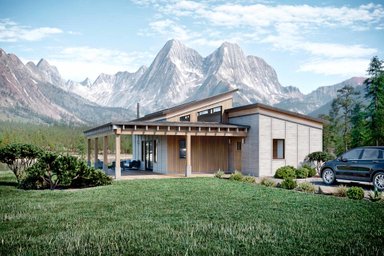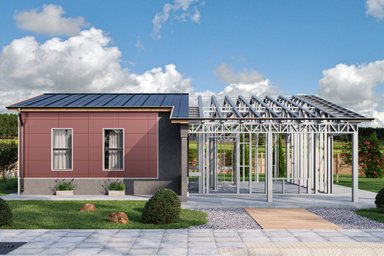[NOTE: I asked Joyanna to find out more about an unusual community that's building some of our Tiny House Plans. -- Dan Gregory, Editor]
Tiny homes giving formerly homeless people the opportunity to become homeowners? You bet! Tiny homes are now being built in a Detroit neighborhood where formerly homeless folks and people with low incomes can rent—and have the opportunity to buy—their own homes. These very small green houses are part of a community within a neighborhood called Cass Community Tiny Homes that’s being developed by the Detroit-based nonprofit Cass Community Social Services (CCSS), which provides health, housing, food and jobs programs in areas of concentrated poverty in the city.
Five Houseplans.com designs were chosen for phase one of the project (which includes 25 tiny homes for single people and couples), and each design is completely different. The reason is simple. “Most of the residents are coming from institutions like homeless shelters or senior apartments where every living space is the same,” says the Rev. Faith Fowler, the CCSS’s executive director. “We wanted to instill pride in the people that no one else has a house like theirs.”
The first Houseplans.com tiny home has already been completed. It's Plan 48-641 (shown below as built in Detroit, and in another version at the top of this post) a 300-square-foot Tudor-
style home that features a fireplace, a large front window and a spacious back deck for outdoor living space,
and was finished in November 2016. Originally designed as a guest house, it's basically one space for living/sleeping/cooking, with a separate bathroom at the back.
Homes currently under construction include Plan 915-7, a cozy 310-square foot cottage with an appealing
front stoop and a front bump-out with several antique-style paned windows; Plan 915-10, a cute 356-square-
foot, shingled bungalow with a neighborly front porch, an open feeling and lots of light; Plan 890-2,
a 320-square-foot modern-style cottage with an inviting front porch, an L-shaped kitchenette and clerestory windows for added light; and Plan 915-3, a charming, classic American clapboard cottage with a welcoming
front porch, plenty of tall windows and a fireplace. Pinnacle Construction built the first home and the other four are being built by Hudson Interiors; Cass’s volunteer corps is doing the interior construction. Fowler anticipates that the houses now under construction should be
finished and ready for move-in by April. And this just in -- the Community just purchased Tower Studio Plan 479-6, shown above, so stay tuned for later updates!
Cass Community Social Services had certain criteria in mind for their tiny homes. “We looked for comfortable, livable homes and wanted variety in our plans,” Fowler says. Distinctive character was important as well. “We were drawn to one-story homes with ample porches or decks and wanted at least one ‘standout feature’ in each house,” such as the metal roof on one house, and the stained-glass window in another. “We like a flood of light, so we wanted many windows on most or all of the walls,” Fowler adds. CCSS also wanted relatively accessible floor plans ranging from 250-425 square feet. Each tiny home features a kitchen, bathroom and bedroom.
Renting to Own
In one month’s time, CCSS received 122 applications to rent the first 25 tiny homes. At least half of the renters selected are formerly homeless people, and the rest are low-income seniors and college students, Fowler says. A couple of low-income Cass staff members were also accepted into the program. Once tenants move in, they pay minimal rent and utilities (e.g. $300 a month rent for a 300-square-foot home and an estimated electric bill of less than $35 per month). After three years, tenants are offered a contract to rent to own their homes within four years. This lengthy process is designed to help residents become disciplined about bill paying and the responsibilities of home ownership.
Cass Community Tiny Homes is located at Woodrow Wilson and Elmhurst streets on a two-and-a-half-block parcel of land that CCSS owns just north of its main campus. Community residents have access to programs on CCSS’s main campus (just a short walk away), including home ownership training, a medical clinic and mental health services, a gym, a library, and transportation services.
While other cities have used tiny homes to house the homeless, this creative rent-to-own program is the first of its kind in Detroit, and possibly, in the country. “We wanted to develop a program that would help people obtain a significant asset so that we weren’t just ending homelessness for people but actually providing the opportunity for them to climb out of poverty,” Fowler explains. “Owning a house means collateral for a loan, or something to sell and/or an asset to leave to a child or children.” Plus, new construction hasn’t been seen in this neighborhood (which includes numerous abandoned buildings and empty lots) in a while, although CCSS has rehabbed some buildings in the area. The budget for phase one of this project is $1.5 million, and $900,000 has already been committed, including $400,000 from Ford Motor Company.
If phase one is successful, CCSS may consider adding an additional phase of homes for families in the future. In 10 years, Fowler hopes that Cass Community Tiny Homes will be a real neighborhood with a strong sense of community where people know each other and enjoy drinking coffee on their porches while the kids play games and ride bikes.
To browse a collection of Tiny Home Plans click here.
Tiny homes giving formerly homeless people the opportunity to become homeowners? You bet! Tiny homes are now being built in a Detroit neighborhood where formerly homeless folks and people with low incomes can rent—and have the opportunity to buy—their own homes. These very small green houses are part of a community within a neighborhood called Cass Community Tiny Homes that’s being developed by the Detroit-based nonprofit Cass Community Social Services (CCSS), which provides health, housing, food and jobs programs in areas of concentrated poverty in the city.
Five Houseplans.com designs were chosen for phase one of the project (which includes 25 tiny homes for single people and couples), and each design is completely different. The reason is simple. “Most of the residents are coming from institutions like homeless shelters or senior apartments where every living space is the same,” says the Rev. Faith Fowler, the CCSS’s executive director. “We wanted to instill pride in the people that no one else has a house like theirs.”
The first Houseplans.com tiny home has already been completed. It's Plan 48-641 (shown below as built in Detroit, and in another version at the top of this post) a 300-square-foot Tudor-
style home that features a fireplace, a large front window and a spacious back deck for outdoor living space,
and was finished in November 2016. Originally designed as a guest house, it's basically one space for living/sleeping/cooking, with a separate bathroom at the back.
Homes currently under construction include Plan 915-7, a cozy 310-square foot cottage with an appealing
front stoop and a front bump-out with several antique-style paned windows; Plan 915-10, a cute 356-square-
foot, shingled bungalow with a neighborly front porch, an open feeling and lots of light; Plan 890-2,
a 320-square-foot modern-style cottage with an inviting front porch, an L-shaped kitchenette and clerestory windows for added light; and Plan 915-3, a charming, classic American clapboard cottage with a welcoming
front porch, plenty of tall windows and a fireplace. Pinnacle Construction built the first home and the other four are being built by Hudson Interiors; Cass’s volunteer corps is doing the interior construction. Fowler anticipates that the houses now under construction should be
finished and ready for move-in by April. And this just in -- the Community just purchased Tower Studio Plan 479-6, shown above, so stay tuned for later updates!
Cass Community Social Services had certain criteria in mind for their tiny homes. “We looked for comfortable, livable homes and wanted variety in our plans,” Fowler says. Distinctive character was important as well. “We were drawn to one-story homes with ample porches or decks and wanted at least one ‘standout feature’ in each house,” such as the metal roof on one house, and the stained-glass window in another. “We like a flood of light, so we wanted many windows on most or all of the walls,” Fowler adds. CCSS also wanted relatively accessible floor plans ranging from 250-425 square feet. Each tiny home features a kitchen, bathroom and bedroom.
Renting to Own
In one month’s time, CCSS received 122 applications to rent the first 25 tiny homes. At least half of the renters selected are formerly homeless people, and the rest are low-income seniors and college students, Fowler says. A couple of low-income Cass staff members were also accepted into the program. Once tenants move in, they pay minimal rent and utilities (e.g. $300 a month rent for a 300-square-foot home and an estimated electric bill of less than $35 per month). After three years, tenants are offered a contract to rent to own their homes within four years. This lengthy process is designed to help residents become disciplined about bill paying and the responsibilities of home ownership.
Cass Community Tiny Homes is located at Woodrow Wilson and Elmhurst streets on a two-and-a-half-block parcel of land that CCSS owns just north of its main campus. Community residents have access to programs on CCSS’s main campus (just a short walk away), including home ownership training, a medical clinic and mental health services, a gym, a library, and transportation services.
While other cities have used tiny homes to house the homeless, this creative rent-to-own program is the first of its kind in Detroit, and possibly, in the country. “We wanted to develop a program that would help people obtain a significant asset so that we weren’t just ending homelessness for people but actually providing the opportunity for them to climb out of poverty,” Fowler explains. “Owning a house means collateral for a loan, or something to sell and/or an asset to leave to a child or children.” Plus, new construction hasn’t been seen in this neighborhood (which includes numerous abandoned buildings and empty lots) in a while, although CCSS has rehabbed some buildings in the area. The budget for phase one of this project is $1.5 million, and $900,000 has already been committed, including $400,000 from Ford Motor Company.
If phase one is successful, CCSS may consider adding an additional phase of homes for families in the future. In 10 years, Fowler hopes that Cass Community Tiny Homes will be a real neighborhood with a strong sense of community where people know each other and enjoy drinking coffee on their porches while the kids play games and ride bikes.
To browse a collection of Tiny Home Plans click here.






